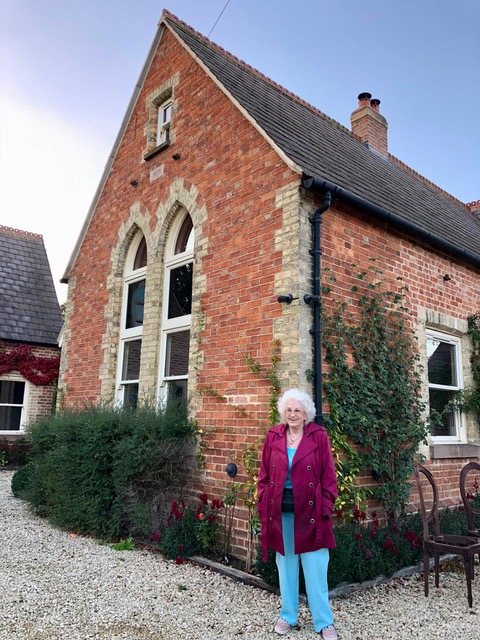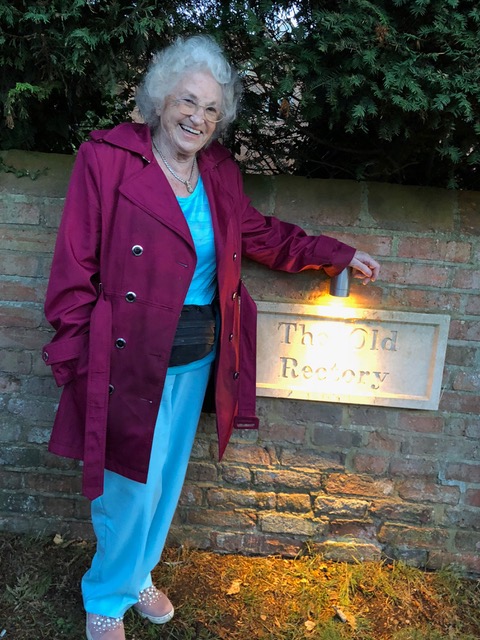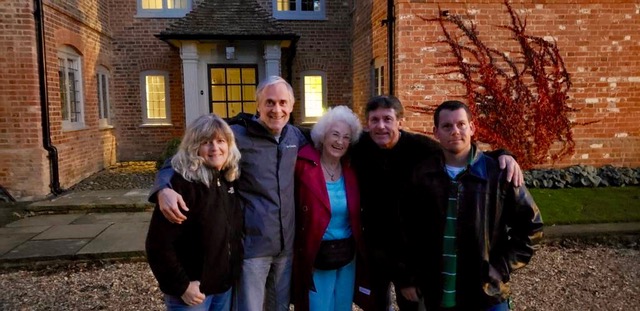Pat McGinn revisits Cublington
My name is Pat McGinn, but I was born Patricia Allen. Last week on October 16th, my family decided to go visit my sister Eileen, as her daughter told us she was ill in the hospital in London. When we left Heathrow, my son hired a car and suggested we go to Cublington, as Eileen and myself lived there in 1939 for nearly 4 years.
In September, 1939 we were at war with Germany. At the time, I was 7 ½ and Eileen was nearly 10. All we were told was that we were going to the country and it would possibly be only until Christmas. So, on the first Saturday in September, we were taken to our school where there were a number of buses. All we had to carry was a case and a gas mask for Eileen, and a back-pack with my clothes and my gas mask inside it. The buses took us to the railroad station, where we were all put on a train with our teachers. The train took us to Leighton Buzzard. Then we got on more buses and went to a place called Cublington. When we arrived at the Cublington School, we went inside and there was a meal prepared for all of us by the women of the village. Each of them had said how many children they were prepared to take and live with them. One of the women was Mrs. (Mollie) Stevens and she said she would take 6 children. Because it was hard to find a family of 6, they decided to take 3 lots of 2 sisters. So they asked us to put up our hands if we were 2 sisters. Well, they called the 2 girls Popkins, then the 2 Bonner girls , then Eileen told me to put up my hand and the teacher, Miss Hammond, called Eileen and myself. We then went with Mrs. Stevens to her home, which was called The Old Rectory. In my eyes it was a huge house. She took us to the part of the house that she stayed in and it was beautiful. I remember saying to Eileen, “Look. They have the pictures here”, as Mrs. Steven had a black and white TV, and Victor Sylvester was playing on it.
The other girls did not stay too long. I think it was because they got home-sick. So, before the end of November, only Eileen and myself were left at the Stevens. We called Mr. and Mrs. Stevens “Madam and Master”. It was a memory of my childhood I shall never forget. Mr. and Mrs. Stevens treated us like we were part of their family. Before Christmas, Madam came to us and asked if we were going to write a letter to Father Christmas. I did not know who Father Christmas was. So, Eileen said, “Think of a toy shop and all the things in it you would like and write them down on the large piece of paper.” So, we did, and then gave it back to Madam. Well, Christmas morning came and as we went out of our bedroom door, there were two pillow cases filled with all the small toys we had asked for. Then we went downstairs to our playroom and we could hardly get in the door for all of the other things we asked for that were there!
That evening both Eileen and myself were given dresses and big bow ribbons to put on our heads. Mine was red and Eileen’s was green, as we told Madam they were our favourite colours. When I look back now, it was like on a box of chocolates—the bow was almost as big as my head! We then went to Madam and Master’s part of the house, and they had friends of theirs, and we celebrated Christmas with them.
The household at the time consisted of Mr. and Mrs. Moore, who were the cook and butler, and Mr. and Mrs. Sparks, who were the housekeeper and head gardener. Then there were Leslie Gardener and Dennis Butcher, who were working under Mr. Sparks as gardeners.
We went to Aston Abbotts to school after Cublington School was closed, as the government said there were too many children for a 2 roomed school. But Mrs. Stevens said that walking all the way to school, which was 2 ½ miles, and back 4 times a day was too much. They tried to tell her we could take sandwiches for lunch, but she still said no, as she thought we should have a hot meal at lunchtime. So, Eileen and myself went to school in the morning and then walked home at lunchtime, bringing our homework with us. Mrs. Moore prepared a hot meal for us. Then we were to sit in the playroom and do our homework and Mrs. Stevens would come over to the playroom and check to see we had done it.
We lived there until Madam and Master decided to move to Scotland as Madam had a brother, Master Dick, who was in the Air Force and was reported missing. So, they decided to go to Scotland and asked our parents if we could go with them. But our parents said it was too far away, so Eileen and I were split up. I went to live with Mr. and Mrs. Sparks and their daughter Sheila, but they could not take Eileen, so she went to stay with another couple.
After the Stevens left, The Old Rectory was owned by Lady Essex. I knew this because at age 15 years, I went back to Cublington to see if Mr. and Mrs. Stevens had moved back, but they had not, so I did not see them again.
When Mrs. Stevens left, Mrs. Sparks went to work for Mrs. Gilbey. One Saturday, Mrs. Gilbey invited Mrs. Sparks, Sheila and myself to go to Aylesbury to the The Bull Hotel for a meal with her. The remembrance of that for me was when we sat down, we had six different knives and forks laid out on either side of the place setting. Mrs. Gilbey told Sheila and I how each serving started at the outside and worked in. We started with fish, and she said it was to clean our pallet. Then we worked in as each course came around. It was a very good experience for me. Still to this day I eat with the knife in my right hand and the fork in my left, unlike the Americans where I live. They pick up both knife and fork to cut their meat, then put down their knife to use the fork to eat with. (That’s how the Americans couldn’t move to Europe as spies, because they shoveled their food. They had to go to England first to learn how to eat. I found that out after the war.)
One of the things I do remember was that Mrs. Gilbey moved into the village with her daughter Susan. Every night Mrs. Gilbey would take her dog Soda for a walk towards Stewkley. To see the two together was so funny, as Soda was bandy and waddled as he walked, and so did Mrs. Gilbey. The kids in the village would stand by the church wall at 5 o’clock, just to see them come past. Do you know who Mrs. Gilbey was? Her husband owned the Gilbey’s Gin company in London.
One day Mr. and Mrs. Sparks decided we’d be going to Cambridge to visit a relative of hers. We went for the weekend and on the way back, we were stopped by some soldiers asking us to give one of the soldiers a lift to Wingrave Crossroads. He climbed in the back with me and as we were going along the road, in the distance, we could see all the bursts of London being bombed. He said, “London’s really getting it tonight,” and I started crying. I started crying because I had not heard from my family for 3 weeks. He asked why I was crying, and Mrs. Sparks explained that I was a London evacuee and that my parents lived in London. He asked what parts and I told him Hoxton, because that’s the only place I knew. He said, “No, don’t worry. They are only bombing the docks, which is a long way from where your parents live.” When we got back to Cublington, Eileen told me the next day that she received a letter from home, and that my mother and father were bombed out, but everybody was OK.
Mr. Biggs was the “Billington Officer”. He was the one who went around the village and spoke to all the families to see how many children families were going to take. He was also the one who found a place for Eileen after the Stevens said they were leaving. Mr. Sparks and Mr. Biggs got together and decided that Mr. Sparks would slaughter a big pig and Mr. Biggs would have one of his cows slaughtered. They would both give up their families’ meat ration coupons for one year, and we would have fresh beef and pork for a year.
After a while, Eileen wanted to go home to London and wrote and told my mother, who said if Eileen comes home, so does Pat.
It was 1943 when Eileen and I came back to London. For me, it was a frightening time as in Cublington we had no bombs dropped. It was a very quiet village and we knew everyone. When I came back to London, it was very noisy, and we lived with the idea that we did not know if we were going to be alive very long. At first the German bombers would come over nightly, so we were supposed to go down to the air raid shelter. But my father said no because he said he did not think the shelter was safe, so we sat on the stairs in the apartment block. As he said, when he looked at the bombed apartments during the day, the only thing standing was the stairs so it was safer for us to be there. Also, he could have a cigarette and that would help him to clear his lungs.
Listening, you could hear the “ping ping ping” every night. You’ve got these airplanes going over and it was funny to hear this “ping ping ping” and I wondered what it was. My father said it was the shrapnel from guns on the railway lines. That’s what we listened to. So nightly, we sat on the stairs and just up the road there was a large gun parked on the railway lines, so when the bombers came over, we could hear it and the shrapnel would fall in the grounds of our apartment, which kept us from getting a good night’s sleep.
Later on, the Germans sent the V1 and V2 Rockets daily. We had no warning that they were coming. We just heard an engine until it stopped and then we knew it was coming down. It was a pilotless plane with a huge bomb, and did quite a lot of damage. I was going to school at the time and quite often the teacher would shout, “get under your desks!” as we could hear them coming and just waited for the engine to stop, for then we knew it was coming down.
Eileen was 14 years old and she had to go to work. She worked for an American company in Camden Town. It was called “The Black Cat” and they made the Craven A Cigarettes. Eileen worked in the factory from 8 in the morning until 5 in the afternoon. I did not see her very much, so we were not as close as we had been in Cublington. Eileen met a woman in her factory named Rosie Reading. She had a son who was in the Navy named Harry. When he came home on leave, Eileen was 15 years old and she met Harry. They met every time he came home. Eileen went with Harry until she was 23, then they got married.
I would like to say right now that going back to see the Old Rectory was such a joy to me. Memories came flooding back and I will always remember that time in my life as I know how it has influenced my life.
So, looking back at 86 years old, I think I took the memories of Cublington and the people of the village and said that I would like my family to live like they did. It was such a wonderful time. I will never forget.
Going back to Cublington after nearly 80 years, I was so thrilled to be able to walk around the grounds the first day and see the lily pond and all the back of the garden, and the old moat that we used to slide on during the winter with master Dick, as he had ice skates and skated around Eileen and myself. I even saw the old school in Aston Abbotts where we went to school after Cublington School was closed.
Comparing the two different ways of life as a child, I can finally look back and say I had a wonderful life living in Cublington and would like to thank every one of the people that made this possible.
I’d like to thank Lucy Peck for allowing us to go back into the Old Rectory and bringing back so many happy memories.
Pat McGinn


